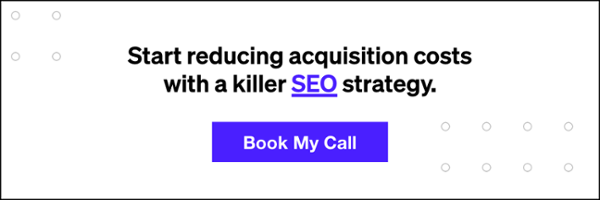5 Essential SEO Tips Even Traditional Marketers Need to Know
Thin Content Can Hurt Your SEO Rankings
Back in the day digital marketers thought that by adding more pages to Google’s index your website would have more opportunities to rank. The idea was to create keyword-rich content that only the Google bots would read causing you to rank for more pages. This method made sense in theory, but then Google caught on to SEOs trying to game the system, and they made some changes.
One of the biggest changes they made that was that they incorporated on-page site metrics to improve organic rankings. Google’s primary goal is to return the best results for the user, and so they take into consideration a website’s site metrics to determine if its content stacks up. The more interesting the content is on your site, the more likely your website’s on-page metrics will be higher.
On-page site metrics include:
- Time on Site
- Bounce Rate
- Pages per Session
Backlinks Are (*Still) Essential
When you are doing PR or getting a product review, you should try to get a link back to your site (if you send them products for a review, make sure the link has a “no-follow” tag). Many traditional marketers are all about the brand mention, and while brand mentions are huge, it is also paramount to get a link back to your site. Studies show that Google still relies heavily on a strong backlink profile in their ranking algorithm.
Keyword Research Is Imperative
It’s not a good idea to build personas around how you might think people are looking for your products. The best approach would be to conduct keyword research, look at your data (CRM, social media channels, analytics, paid search, etc.) and then develop personas around your findings. Doing the research first can save you a lot of time in the long run and take the guesswork out of how people are searching for your offerings.
SEO Is Not All Technical
A lot of traditional marketers think SEO is a techie field. There is a broad side of SEO that is technical, like site speed and schema markup, but content has taken center stage in the SEO world. Having a content strategy with specific, measurable goals is critical to a strong SEO strategy and your overall digital marketing objectives. Is the goal brand awareness, conversions, increase time on site, link bait, or increase in pages per visit?
These are all great questions to ask when developing a content strategy for your digital footprint. Understanding how content impacts your SEO campaign is essential for traditional marketers when planning and executing content like blog articles, webinars, white papers, and video assets for a website.
Know How To Tell If A Backlink Is Toxic Or Spam
Because Google relies on a strong backlink profile, many companies went after as many links as they could regardless of the quality. Google then responded by updating their algorithm to devalue a site’s authority based on a spammy link profile. Many SEOs weren’t sure exactly how Google determined whether or not a link was considered spam. But over the years, people have tested and designed software that determines whether or not a link is spam. When prospecting for backlinks it is good for traditional marketers to look at a site’s domain authority and relevance.
Wrapping Up
The bottom line here is that in SEO, what you don’t know can hurt you. In this day and age, every brand has a website and more than likely you will be asked to work on it at some point. Having a basic understanding of SEO is crucial to making sure you are operating within Google’s best practices. With a solid basis of SEO knowledge and these five SEO tips, you’ll be ready to direct upcoming marketers and be able to talk through reports to the C-Level suite.


















